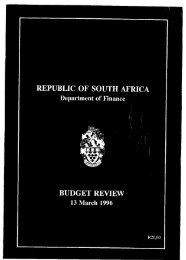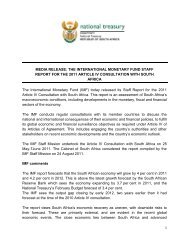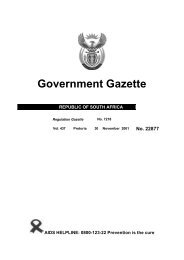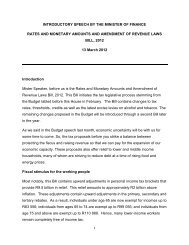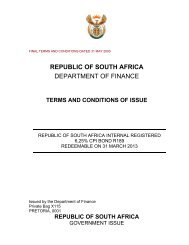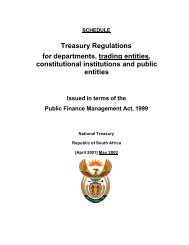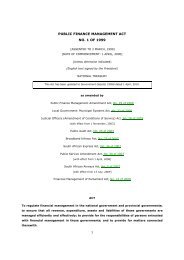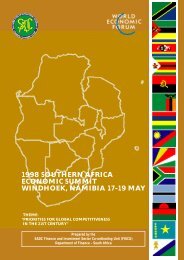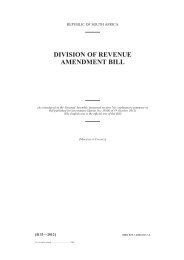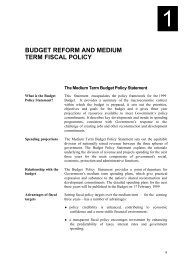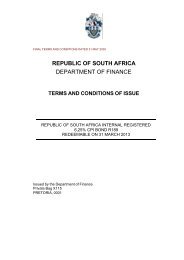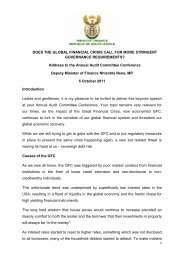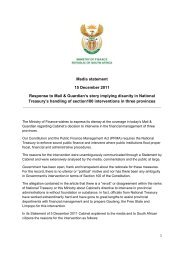Annual Performance Plan Jaarlikse ... - National Treasury
Annual Performance Plan Jaarlikse ... - National Treasury
Annual Performance Plan Jaarlikse ... - National Treasury
Create successful ePaper yourself
Turn your PDF publications into a flip-book with our unique Google optimized e-Paper software.
B.8 Auxiliary and associated services<br />
The following are the measurable objectives (▲) relating to programme 7, and their performance measures (►):<br />
<strong>Annual</strong> <strong>Performance</strong> <strong>Plan</strong> 2007/08 – 2009/10<br />
Measurable objectives <strong>Performance</strong> measures<br />
Access ▲ To deliver HIV/AIDS life skills education in<br />
schools, and to ensure access to an<br />
appropriate and effective integrated system of<br />
prevention, care and support<br />
Specified policies, priorities and strategic objectives<br />
• Strategic goals and objectives:<br />
To provide human resource development in accordance with the Skills Development Act.<br />
• To support the ETDP SETA with regard to the administration of the sector<br />
► PPM 801: Number of educators trained to deliver<br />
HIV/IDS and sexuality life skills education<br />
► PPM 802: Percentage annual delivery to schools<br />
of requested TLSM<br />
► PPM 803: Number of school-communities ‘trained’<br />
and supported in the implementation of Care &<br />
Support strategies for vulnerable children<br />
► PPM 804: Number of SMTs and SGBs ‘trained’<br />
and supported in the development of HIV/AIDS<br />
policy and management plans, within the context of<br />
WSE and SIPs<br />
To provide for HIV/AIDS life skills education in schools, and to ensure access to an appropriate and effective integrated<br />
system of prevention, care and support. Systems-wide, this includes strategies to prevent HIV infection in educators and<br />
learners, to manage HIV/AIDS in school-communities, to provide psychosocial support for affected educators and<br />
learners, and to manage the total response to HIV/AIDS in order to protect the quality of education.<br />
• To adequately train and support 80% of GET educators and 80% of FET Life Orientation educators to ensure that<br />
all learners in Grades 1 to 12 receive a minimum of 20 hrs of age and context-appropriate, KSAV-based,<br />
interactive HIV/AIDS life skills and sexuality education annually, through Life Orientation and the infusion of<br />
HIV/AIDS life skills across other subjects and learning areas (ref <strong>National</strong> Integrated <strong>Plan</strong> for Children Infected and<br />
Affected by HIV and AIDS, 2001; cf WHO/UNESCO minimum of 40 hrs per annum to bring about behaviour<br />
change).<br />
• To provide for the development, selection, translation, procurement and distribution of age/grade and languageappropriate,<br />
curriculum-based, AIDS-specific learner and teacher support materials (LTSM) to support effective<br />
HIV/AIDS life skills education in the classroom.<br />
• To ‘train’ stakeholders and support the establishment of appropriately networked, effective, sustainable schoolcommunity-based<br />
Care and Support strategies for vulnerable children.<br />
• To ensure that SMT members and key parent SGB members and community representatives are ‘trained’ and<br />
supported in the development and maintenance of a contextually-appropriate AIDS policy and HIV/AIDS<br />
Management <strong>Plan</strong> - within the context of the nine focus areas of Whole School Evaluation (WSE) and the<br />
development of School Improvement <strong>Plan</strong>s (SIP).<br />
• To support the development and implementation of effective, adolescent HIV-preventative, quality-assured peer<br />
education programmes in schools and FET colleges.<br />
• To develop information-sharing and motivation strategies that encourage pro-active participation in local<br />
programme development and advocacy opportunities (such as Valentine’s Day, School AIDS Month, Condom<br />
Week, SGB meetings, peer education and holiday programmes, parenting workshops, etc.) and the furthering of a<br />
broad-based, multi-sectoral ‘enabling environment’ for effective prevention, care and support.<br />
• To develop an effective, integrated, mainstreamed (and thus sustainable) intra- and inter-departmental HIV/AIDS<br />
management system for the WCED – inclusive of an inter-directorate HIV/AIDS Management Unit and district<br />
HIV/AIDS management units/teams, provincial and district-based master training pools, district-based psychosocial<br />
support services, inter-sectoral collaboration and partnership management, the establishment of School HIV/AIDS<br />
Co-ordinators and school clusters, quality assurance (through research, policy development, monitoring and<br />
evaluation), and efficient programme administration and financial management.<br />
• To provide for appropriate initiatives in Centres for Early Learning, ABET Centres and FET colleges.<br />
• To implement an employee HIV/AIDS workplace programme and Employee Wellness Programme (EWP).<br />
71



